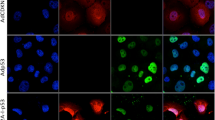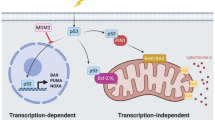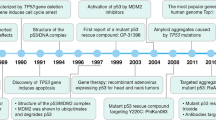Abstract
p53 gene therapy is being tested clinically for the treatment of human cancer, however, some cancer models (in vivo and in vitro) are resistant to p53. To explore the potential use of two p53 homologues, p73 and p51/p63, in cancer gene therapy, we introduced p53, p73 and p51/p63 into colorectal cancer cell lines via adenoviral vectors, and compared their effects on cell growth. Among 10 cell lines tested, six cell lines displayed a similar response following transduction of p53, p73β or p51A/p63γ; two lines underwent cell-cycle arrest, three lines exhibited apoptosis and one line showed no-effect following transduction. The effect on cell-cycle progression was variable in the other four cell lines. Interestingly, three cell lines were resistant to p53-mediated apoptosis, including two lines having endogenous wild-type p53 alleles, but underwent apoptosis after transduction of p73β or p51A/p63γ. Similar to p53, transduction of p51A/p63γ induced extensive apoptosis when combined with adriamycin or X-radiation in SW480 cells, which are normally resistant to apoptosis. Transduction of p73β and p51A/p63γ also reduced the tumorigenicity of two colorectal cancer cells in vivo. These results suggest that adenovirus-mediated p73β and p51A/p63γ transfer are potential novel approaches for the treatment of human cancers, particularly for tumors that are resistant to p53 gene therapy. Gene Therapy (2001) 8, 1401–1408.
This is a preview of subscription content, access via your institution
Access options
Subscribe to this journal
Receive 12 print issues and online access
$259.00 per year
only $21.58 per issue
Buy this article
- Purchase on Springer Link
- Instant access to full article PDF
Prices may be subject to local taxes which are calculated during checkout






Similar content being viewed by others
References
el-Deiry WS . Regulation of p53 downstream genes Semin Cancer Biol 1998 8: 345–357
Tokino T, Nakamura Y . The role of p53-target genes in human cancer Crit Rev Oncol Hematol 2000 33: 1–6
Vogelstein B et al. Surfing the p53 network Nature 2000 408: 307–310
Hollstein M et al. p53 mutations in human cancers Science 1991 253: 49–53
Levine AJ et al. The p53 tumour suppressor gene Nature 1991 351: 453–456
Clarke AR et al. p53 dependence of early apoptotic and proliferative responses within the mouse intestinal epithelium following gamma-irradiation Oncogene 1994 9: 1767–1773
Merritt AJ et al. The role of p53 in spontaneous and radiation-induced apoptosis in the gastrointestinal tract of normal and p53-deficient mice Cancer Res 1994 54: 614–617
Roemer K, Friedmann T . Mechanisms of action of the p53 tumor suppressor and prospects for cancer gene therapy by reconstitution of p53 function Ann NY Acad Sci 1994 716: 265–280 discussion 280–262
Polyak K et al. Genetic determinants of p53-induced apoptosis and growth arrest Genes Dev 1996 10: 1945–1952
Roth JA et al. Retrovirus-mediated wild-type p53 gene transfer to tumors of patients with lung cancer Nat Med 1996 2: 985–991
Swisher SG et al. Adenovirus-mediated p53 gene transfer in advanced non-small-cell lung cancer J Natl Cancer Inst 1999 91: 763–771
Nemunaitis J et al. Adenovirus-mediated p53 gene transfer in sequence with cisplatin to tumors of patients with non-small-cell lung cancer J Clin Oncol 2000 18: 609–622
Kaghad M et al. Monoallelically expressed gene related to p53 at 1p36, a region frequently deleted in neuroblastoma and other human cancers Cell 1997 90: 809–819
Yang A et al. p63, a p53 homolog at 3q27–29, encodes multiple products with transactivating, death-inducing, and dominant-negative activities Mol Cell 1998 2: 305–316
Osada M et al. Cloning and functional analysis of human p51, which structurally and functionally resembles p53 Nat Med 1998 4: 839–843
Yang A, McKeon F . p63 and p73: p53 mimics, menaces and more Nat Rev Mol Cell Biol 2000 1: 199–207
Jost CA et al. p73 is a human p53-related protein that can induce apoptosis Nature 1997 389: 191–194
Zhu J et al. The potential tumor suppressor p73 differentially regulates cellular p53 target genes Cancer Res 1998 58: 5061–5065
Shimada A et al. The transcriptional activities of p53 and its homologue p51/p63: similarities and differences Cancer Res 1999 59: 2781–2786
Ishida S et al. Adenovirus-mediated transfer of p53-related genes induces apoptosis of human cancer cells Jpn J Cancer Res 2000 91: 174–180
Irwin MS, Kaelin WG Jr . Role of the newer p53 family proteins in malignancy Apoptosis 2001 6: 17–29
Malkin D et al. Germ line p53 mutations in a familial syndrome of breast cancer, sarcomas, and other neoplasms Science 1990 250: 1233–1238
Celli J et al. Heterozygous germline mutations in the p53 homolog p63 are the cause of EEC syndrome Cell 1999 99: 143–153
Donehower LA et al. Mice deficient for p53 are developmentally normal but susceptible to spontaneous tumours Nature 1992 356: 215–221
Yang A et al. p63 is essential for regenerative proliferation in limb, craniofacial and epithelial development Nature 1999 398: 714–718
Mills AA et al. p63 is a p53 homologue required for limb and epidermal morphogenesis Nature 1999 398: 708–713
Yang A et al. p73-deficient mice have neurological, pheromonal and inflammatory defects but lack spontaneous tumours Nature 2000 404: 99–103
el-Deiry WS et al. WAF1, a potential mediator of p53 tumor suppression Cell 1993 75: 817–825
Vinyals A et al. Failure of wild-type p53 gene therapy in human cancer cells expressing a mutant p53 protein Gene Therapy 1999 6: 22–33
Gomez-Manzano C et al. Adenovirus-mediated transfer of the p53 gene produces rapid and generalized death of human glioma cells via apoptosis Cancer Res 1996 56: 694–699
Harris MP et al. Adenovirus-mediated p53 gene transfer inhibits growth of human tumor cells expressing mutant p53 protein Cancer Gene Ther 1996 3: 121–130
Bookstein R et al. p53 gene therapy in vivo of herpatocellular and liver metastatic colorectal cancer Semin Oncol 1996 23: 66–77
Shinoura N et al. Degree of apoptosis induced by adenovirus-mediated transduction of p53 or p73α depends on the p53 status of glioma cells Cancer Lett 2000 160: 67–73
Fujiwara T et al. Induction of chemosensitivity in human lung cancer cells in vivo by adenovirus-mediated transfer of the wild-type p53 gene Cancer Res 1994 54: 2287–2291
Gallardo D et al. Adenovirus-based transfer of wild-type p53 gene increases ovarian tumor radiosensitivity Cancer Res 1996 56: 4891–4893
Ogawa N et al. Novel combination therapy for human colorectal cancer with adenovirus-mediated wild-type p53 gene transfer and DNA-damaging chemotherapeutic agent Int J Cancer 1997 73: 367–370
Vikhanskaya F et al. p73α overexpression is associated with resistance to treatment with DNA-damaging agents in a human ovarian cancer cell line Cancer Res 2001 61: 935–938
Prabhu NS et al. p73β, unlike p53, suppresses growth and induces apoptosis of human papillomavirus E6-expressing cancer cells Int J Oncol 1998 13: 5–9
Yamano S et al. Induction of transformation and p53-dependent apoptosis by adenovirus type 5 E4orf6/7 cDNA J Virol 1999 73: 10095–10103
Nigro JM et al. Mutations in the p53 gene occur in diverse human tumour types Nature 1989 342: 705–708
Rodrigues NR et al. p53 mutations in colorectal cancer Proc Natl Acad Sci USA 1990 87: 7555–7559
Cottu PH et al. Inverse correlation between RER+ status and p53 mutation in colorectal cancer cell lines Oncogene 1996 13: 2727–2730
Jia LQ et al. Screening the p53 status of human cell lines using a yeast functional assay Mol Carcinog 1997 19: 243–253
Acknowledgements
We thank Dr Joseph F Costello for critical comments about this manuscript. This research was supported in part by Grants-in-Aid for Cancer Research from the Ministry of Education, Culture, Sports, Science and Technology of Japan.
Author information
Authors and Affiliations
Rights and permissions
About this article
Cite this article
Sasaki, Y., Morimoto, I., Ishida, S. et al. Adenovirus-mediated transfer of the p53 family genes, p73 and p51/p63 induces cell cycle arrest and apoptosis in colorectal cancer cell lines: potential application to gene therapy of colorectal cancer. Gene Ther 8, 1401–1408 (2001). https://doi.org/10.1038/sj.gt.3301538
Received:
Accepted:
Published:
Issue Date:
DOI: https://doi.org/10.1038/sj.gt.3301538
Keywords
This article is cited by
-
A novel approach to cancer treatment using structural hybrids of the p53 gene family
Cancer Gene Therapy (2012)
-
Genomic screening for genes upregulated by demethylation revealed novel targets of epigenetic silencing in breast cancer
Breast Cancer Research and Treatment (2010)
-
N-Propionyl-Cysteaminylphenol-Magnetite Conjugate (NPrCAP/M) Is a Nanoparticle for the Targeted Growth Suppression of Melanoma Cells
Journal of Investigative Dermatology (2009)
-
CHFR, a potential tumor suppressor, downregulates interleukin-8 through the inhibition of NF-κB
Oncogene (2009)
-
The role of HRK gene in human cancer
Oncogene (2008)



